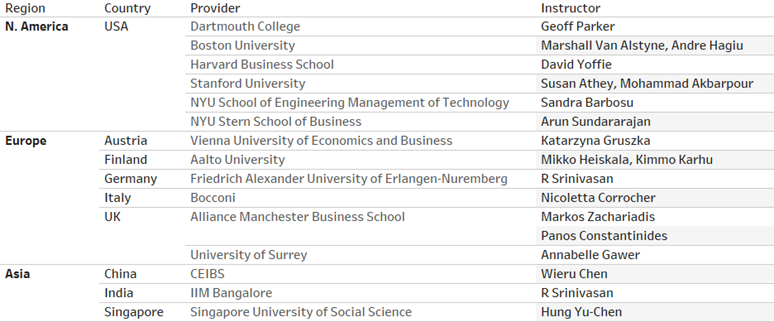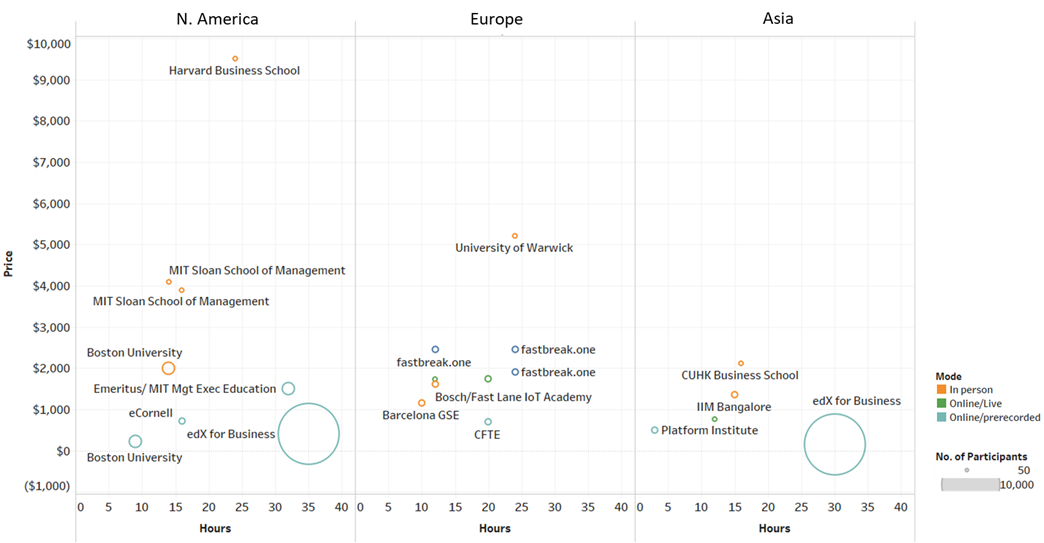Platform businesses can now be found in nearly every corner of the economy. This growth is driving the need for professional managers who can lead the complexities of running platform companies or platform product lines within larger companies.
A decade ago, when platform companies were just gaining traction as an economic force, executives moved up the ranks largely through the school of hard knocks. They either started or joined a platform startup and learned on the job. For example, PayPal was a particularly fertile ground to learn platform concepts and management.[i]
Today, there are a growing number of other options for acquiring the education and training needed to jumpstart a career or retool to move into a new industry. The rewards are often significant. Platform professional are in demand, they are well paid, and, more-often-than-not, they themselves at the center of a company’s growth strategy.
How does one become a platform professional? What degree programs, courses, and masterclasses are available?
In this article, I review platform specific educational opportunities worldwide. They can be broken into three major groups 1) courses offered within traditional degree programs; 2) executive education courses, and 3) courses offered by vendors.
Degree Programs
There are no degree programs specific to platform strategy and management. There are, however, a growing number of platform-specific elective courses within traditional degree programs. When we look worldwide, there are a least 16 courses being offered in the Fall of 2020 or Spring of 2021 (see Figure 1).
There are some platform courses offered in engineering and economics departments, while the majority are electives within traditional MBA programs. In Asia, there are courses at CEIBS in Shanghai, China, Singapore University of Social Science and at IIM in Bangalore, India. In Europe, there are now electives at Aalto University in Finland, Friedrich Alexander University in Germany, Vienna University of Economics and Business in Austria, Bocconi University in Italy, and Toulouse School of Economics in France.
In the UK, courses are now offered at the University of Surrey and at the Alliance Manchester Business School. In the United States, the top platform courses are now taught at Dartmouth College, Boston University, Harvard University, New York University and Stanford University.
Semester-long courses offer an opportunity to cover or at least introduce a range of platform related issues. As one course description advertised the course will examine “platform strategy, such as two-sided markets, first mover advantage, network effects, the chicken-or-egg dilemma, monetization strategies, freemium models, intellectual property rights, startup strategy, crowdsourcing applications, platform governance and regulation issues, among others.”[ii]
Other courses provide a sector perspective, with a focus on areas with rapid platform growth banking and financial services, of the course in Singapore University of Social Science, which looks at platforms from the perspective or marketing. Finally, some courses, such as the courses offered at Dartmouth and Boston University, make projects with “client” companies a central part of the pedagogy.
Since these courses are bundled within larger degree programs with substantial time commitments (typically 2 years) and financial commitment (tuition plus the opportunity cost of not working), these degree programs serve a relatively small community.
Figure 1. Platform Elective Courses within Traditional Degree Programs
Source: Platform Strategy Institute, 2020
Executive education
A second category is platform executive education courses aimed at professionals and executives. There are now 25 of these courses offered world-wide of various designs. A key difference is the mode of delivery—in person, live-online, and prerecorded. And another variable is who leads the course—faculty that specialize in platforms, consultants, or practitioners. Finally, the courses differ in focus with some broad treatments of platform strategy and governance while others focus on specific sectors like banking as well as where they are offered—N. America, Europe or Asia (see Figure 2).
The in-person events typically last two to four days and involve between 15 to 24 hours of instruction. The fees for these courses run from $1,360 to $9,500. At the upper end are intensive in person courses that cater to more senior executives and are often held at posh locations like The Shard in London. These courses not only emphasize the content but the professional networking opportunities.
The average cost of in-person is approximately $200 per hour but the range is quite significant going from $90 per hour for the course offered at IIM in Bangalore to nearly $400 per hour for the course planned at Harvard Business School in March 2021. These courses are typically paid for by companies as part of their leadership training programs.
A second type is are live online courses. These courses range in price from $1,000 to $4,000 and last between 12 to 20 hours. The average cost per hour of these courses is $99 per hour ranging from a high of $145 per hour for the course hosted by GERBUS in Germany to $63 per hour for the on-line course. Most of these courses also target companies but are within the range of individuals to finance on their own.[iii]
Figure 2. Platform Executive Education Course by Region
Source: Platform Strategy Institute, 2020
The third type of platform course is the online prerecorded offering. These “asynchronous” courses can have scheduling advantages. Even the courses with fixed dates provide participants with significant flexibility regarding when the course work is completed. The cost per hour is also significantly lower. These courses range from a high of $166 dollars per hour to a low of just $5 per hour. Some are even free if the participant does not want a certificate of completion.
Within the 25 platform offerings now available, there is a range of choice in terms of time commitment. The shortest prerecorded offerings can be completed in as little as 3 hours up to 30 hours paced over multiple weeks. for the edX courses that are expected to be completed over several weeks.
Vendor Training
The third category of platform education is vendor-backed courses. As platforms have grown in demand and the scale, so have companies that provide solutions, such as “platforms-as-a-service” for cloud applications, connected cars, open banking and B2B marketplaces.[iv] Vendors now offer platform related training and certifications.
Bosch provides an example. The German multinational engineering and technology company teamed up with Fast Lane, a company specializing in IT training, to offer a course that explores the relationship between Internet of Things (IoT), platform business models and innovation. The goal of this course is to provide participants with the ability to identify platform related IoT applications and business model innovation that can be adopted in their organizations.[v]
Technical training programs are offered by companies specializing in API management. MuleSoft, now owned by Salesforce, offers courses to develop skills and best practices to implement specific Mule applications, such as Anypoint Studio and Anypoint Platform.[vi]
The courses include training on how to securely provisioning API-related artifacts; automating the building, unit testing, and deployment of applications technical competencies that support data integrations for platform development. They are offered via a mix of approaches: prerecorded, live online and in person.
Similarly, Mirakl, a company specializing in B2B marketplaces, has also entered the training game. It now offers three and a half-day courses to train teams on the technical and business aspects of marketplace management.[vii] The goal is to train teams, whether developing new or adding features to the existing marketplace will learn about operating a marketplace in general and Mirakl’s solutions in particular.
Conclusion
As this overview illustrates, platform education and training are growing world-wide. Offerings range from specialized courses within traditional degree programs to Executive Education programs catering to companies looking for specialized platform leadership development.
There are also online programs that serve professionals seeking to advance their careers or to switch into opportunities that are opening in fast-growing areas like B2B commerce marketplaces. The offerings suggest a diverse and even fragmented market that is far from the winner-take-all outcome that platform pundits often worry about.
If anything, the market is highly fragmented. In short, there are many ways to tap into education and training opportunities to become a platform professional.
References
[i] For an interactive visualization, which maps the PayPal executives that went on to start other platform companies see: https://fleximize.com/paypal-mafia/
[ii] Thayer School of Engineering at Dartmouth, ENGM 190: Platform Design, Management, and Strategy, https://engineering.dartmouth.edu/academics/courses/engm190
[iii] Amod Lele, “Synchronous vs. Asynchronous Online Learning,” BU Digital Learning, https://digital.bu.edu/synchronous-vs-asynchronous-the-biggest-difference/
[iv] Sarabeth Lewis, “Magnifying the Massive Growth in B2B Marketplaces,” G2 Learn, April 2, 2020, https://learn.g2.com/what-is-a-b2b-marketplace
[v] Training IoT & Platform Business Model Innovation (BC-F105), FastLane, https://www.flane.de/en/course/bo-bc-f105#top
[vi] MuteSoft Courses, https://training.mulesoft.com/course-catalog
[vii] Mirakl University, https://info.mirakl.com/mirakl-university
Article by channel:
Everything you need to know about Digital Transformation
The best articles, news and events direct to your inbox
Read more articles tagged: Featured, Platforms and Ecosystems











